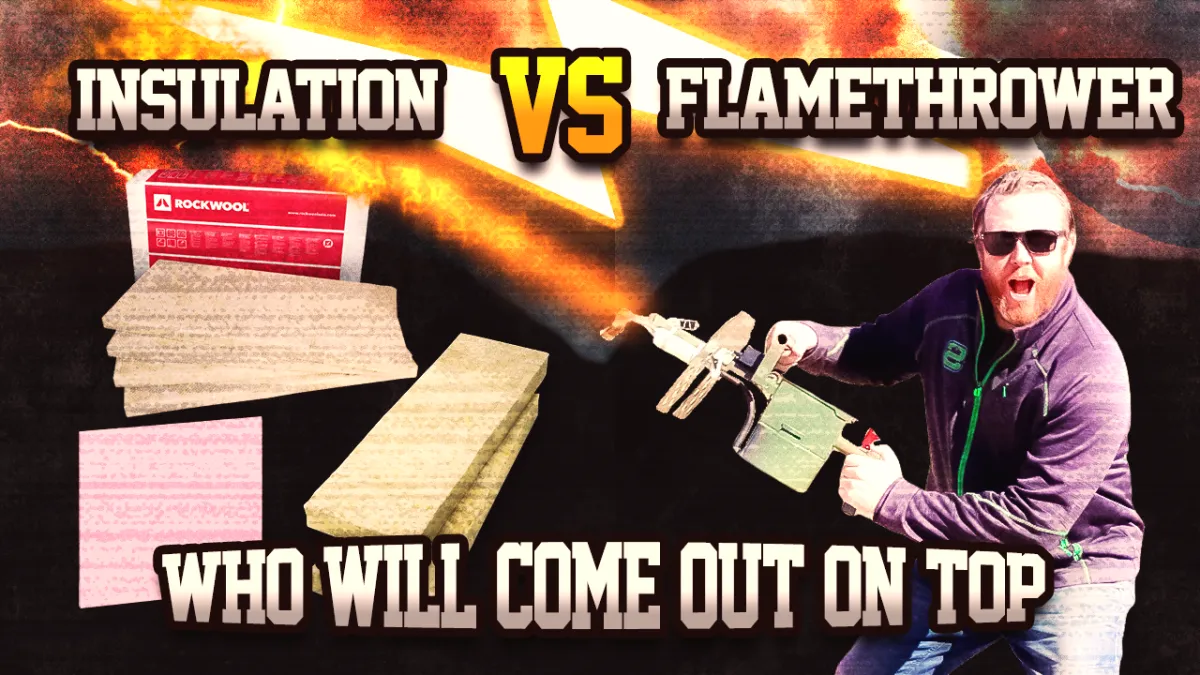
Insulation VS Flamethrower: Is Insulation Flammable
Hey folks, it’s TJ from Sanctified Homes, back with another hands-on test that’s all about keeping your home safe and making informed choices. Today, we're putting different types of insulation to the ultimate test against a flamethrower to see which one holds up best. Safety is paramount in construction, and choosing the right insulation is crucial not just for comfort and energy efficiency but for fire resistance too. We're testing rock wool, fiberglass ("bad insulation"), and foam board insulation to see how they react under extreme heat. This isn’t just about seeing which materials burn; it’s about understanding how they protect—or fail to protect—your home in the event of a fire.
Understanding Different Insulation Materials
Rock Wool Insulation
Rock wool, made from mineral fibers, is known for its fire-resistant qualities. In our tests, when exposed to extreme heat, rock wool's ability to resist burning was impressive. Even when the gas from the flamethrower initially caught fire on the surface, the insulation itself did not sustain the flame. This material is not only fire-resistant but also durable against pests, making it a top choice for both urban and rural settings. For more on why rock wool might be the right choice for your home, check out our detailed guide here.
Fiberglass Insulation
Fiberglass, commonly referred to by TJ as "bad insulation" during the test, initially resisted the flame but eventually caught fire, continuing to burn even after the gas had burned off. This highlights a significant risk in terms of fire safety, as the material can contribute to fire spread within a home. While it’s a popular insulation choice due to its cost-effectiveness and sound-dampening properties, its performance in a fire scenario can be a concern. Learn more about weighing the pros and cons of fiberglass here.
Foam Board Insulation
Foam board did the poorest in our fire resistance test. It not only caught fire quickly but also melted into a sticky, oozy substance, releasing potentially harmful chemicals. The rapid degradation of this material in high heat and its contribution to toxic smoke can be incredibly dangerous during a fire, posing serious risks to both property and personal safety. For alternatives to foam board that offer better safety profiles, visit our page on safer insulation choices.
Choosing the Right Insulation for Fire Safety
Selecting the right insulation is more than just about thermal ratings and energy efficiency; it's also about considering how materials react in a fire. Our tests show that rock wool stands out as the safest option among the three, with significant resistance to fire without compromising on insulative properties or pest resistance.
When building or renovating your home, consider the fire safety aspect of every material you choose. It's not just a matter of compliance or comfort but a critical component of your home's safety strategy. Always consult with a building professional who can provide insights based on the latest research and product performances.
Conclusion: Safety First in Insulation Choice
The results from our flamethrower test are clear: not all insulation is created equal, especially when it comes to fire resistance. As homeowners, it's crucial to look beyond the surface benefits of materials like cost savings and consider the long-term implications, particularly safety. Opting for materials like rock wool can significantly enhance your home's resilience against fire, offering peace of mind that other materials simply can't match.
For more information on choosing the right materials for your home and ensuring every aspect of your build meets high safety standards, check out our resources and tips at Sanctified Construction. And as always, remember to elevate your standards in home building for the safety and well-being of your family. Don't forget to raise your standard!

Home Building Checklist
We understand that the process of building comes with a lot of decision-making. So we created the Home Building Checklist to guide your decision-making process, and it's yours for free here!

The Blessed to Build Foundation is a 501(c)3 Non Profit providing education & resources to help homeowners and home builders make informed choices about building homes that last.
Dane County, Wisconsin
Hire a Builder
If you are looking to build a new home in the following cities, connect with Sanctified Homes & Construction to start the conversation.
Copyright Blessed to Build Foundation, Inc. 501(c)3

